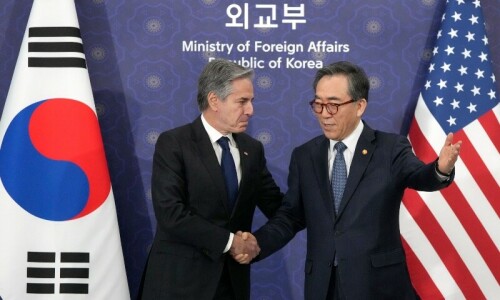SARAJEVO, Oct 4 Partial results from Bosnia's election pointed to political deadlock on Monday with leaders and parties divided down ethnic lines.
Muslims supported parties favouring a united Bosnia, Serbs backed nationalists urging secession, and Croats voted for parties seeking their own entity within Bosnia, according to more than 70 per cent of votes for the national parliament.
The results, if confirmed, would make it very hard to form a national coalition and begin reforms needed for EU membership, political analysts and diplomats said.
“We will have no government yet this year,” said international peace overseer Valentin Inzko, adding he did not expect a government to be formed before February 2011.
“This is normal here. This has happened since 1995, the formation of new governments always lasted between four and five months,” he said.
Since the last election in 2006, mistrust has deepened between Croat, Serb and Muslim leaders, and political divisions have widened between the country's two regions, the Muslim-Croat federation and the Serb Republic.
Voters in the Serb Republic backed the Serb nationalist Alliance of Independent Social Democrats (SNSD), while the Muslim-Croat federation voted for the multi-ethnic Social Democratic Party (SDP).
“Any possibility of cooperating with the SDP at the Bosnia-Herzegovina (national) level is exclu-ded,” Bosnian Serb leader Milorad Dodik, whose SNSD party campaigned on threats of secession, said on Sunday.
The divisions thrown up by the parliamentary poll were also reflected in elections for the country's tripartite presidency, which is shared between Serbs, Muslims and Croats.
As well as seeing his party doing well in the parliamentary vote, Dodik convincingly won the Serb Republic presidential vote with 53.3 per cent support with 93 per cent of ballots counted.
Dodik said that within the Serb Republic, he would ally only with the largest Croat party, the Croatian Democratic Union (HDZ), which scored well in Croat-dominated areas, and which has called for the creation of its own Croat entity within Bosnia.
Wartime President Alija Izetbegovic's son Bakir, of the Party of Democratic Action (SDA), won the race for the presidency's Muslim seat and Zeljko Komsic, the candidate of the Social Democratic Party (SDP), recaptured the Croat seat.
Both men are seen as moderates ready to pursue reforms.
Since the 1992-95 war in which about 100,000 people were killed, Bosnia has lagged in political and economic reforms and remains near the back of the queue of Western Balkan countries aspiring to EU and Nato membership.—Reuters







































Dear visitor, the comments section is undergoing an overhaul and will return soon.